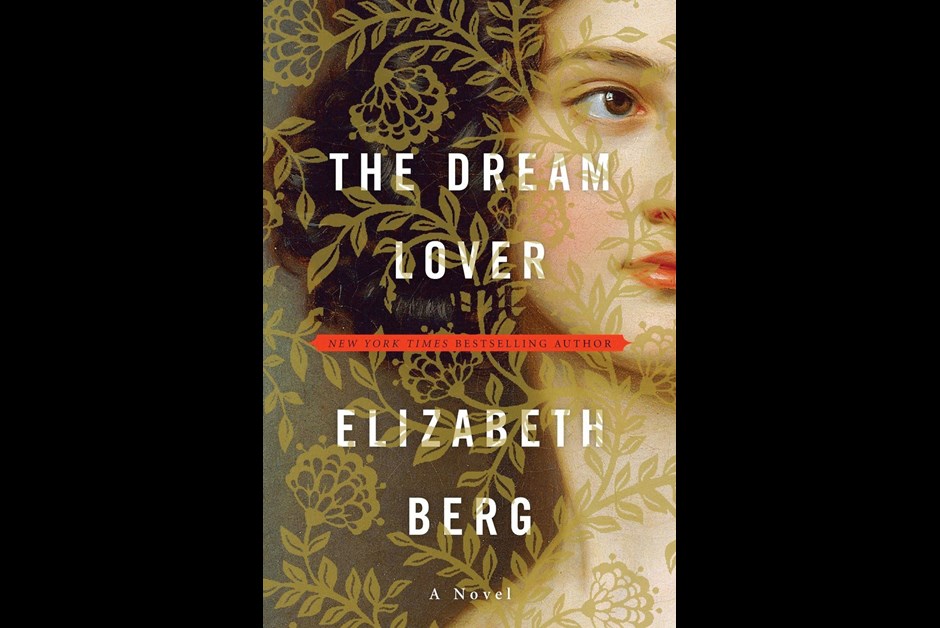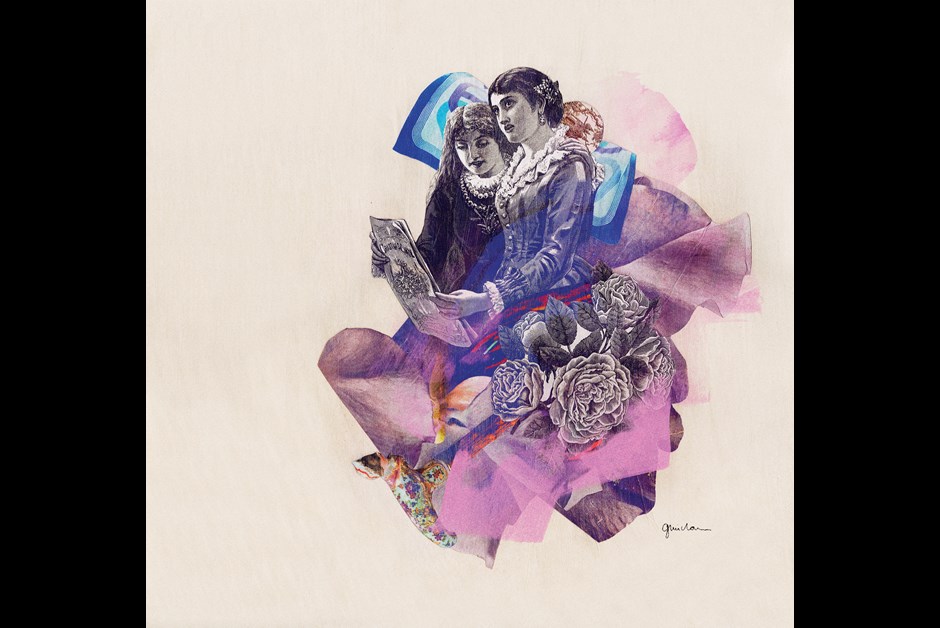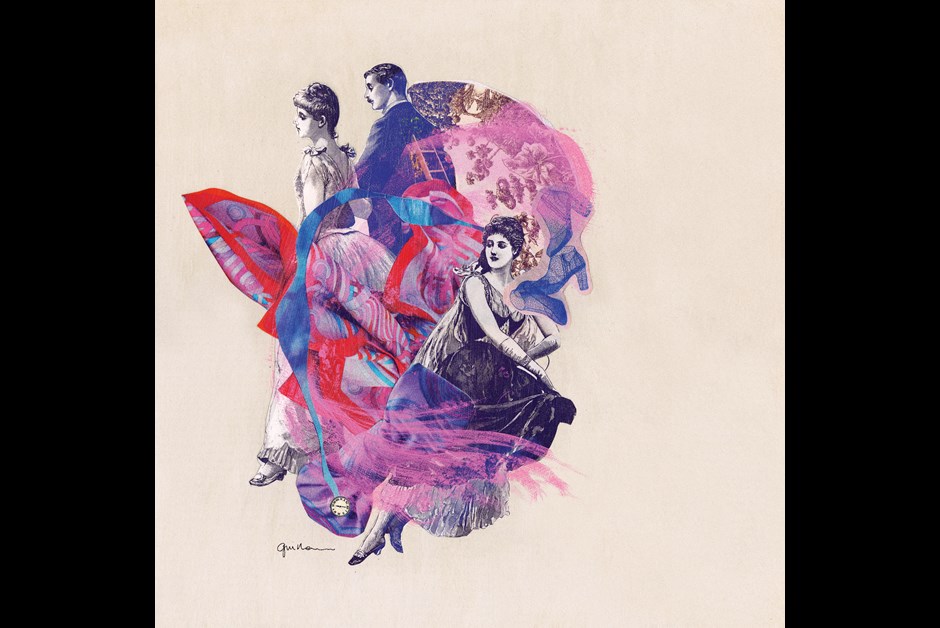The Dream Lover
Book Excerpt: The Dream Lover
Destination reading in partnership with Penguin Random House.
From the novel by: Elizabeth Berg
Illustrations by: Guillaume Brière
July 1804, Rue Meslay Paris
On the day of my birth, my father was playing his beloved violin at a party given
for my mother’s newly engaged sister, my aunt Lucie. My mother, resplendent in a ruffled pink silk dress and matching shoes with pearls at the center of their bows, was dancing a quadrille. She excused herself suddenly and repaired to a nearby bedroom overlooking the garden, where she gave birth to me, reportedly without a sound and also very quickly. It was Lucie who attended my birth, a consequence of my mother having latched onto my aunt’s arm at the moment she realized it was time.
After she ensured that mother and baby were stable, Lucie went back to the party to tell my father the news. She made her way through the revelers and approached the small group of musicians, who stood with my father in the corner of the room. She laid her hand on Maurice’s arm, stopping his playing. The other musicians stopped playing as well, and the crowd grew abruptly silent. Lucie said into the stillness, “Come, Maurice, you have a daughter.” This announcement was greeted with a great burst of applause.
“She will be fortunate,” my aunt told the guests, over her shoulder, as she led my father to the bedroom. “For she was born in the time of roses, to the sounds of music.” Now the crowd laughed, and then the music began again. I turned my head toward the sound, drawn to music then as I ever would be.
And then there was my father, holding me in his arms. His tears fell on my forehead, and his long forefinger gently wiped them away; but I, still in possession of the short-lasting but infinite wisdom that is ours in the womb, felt his great joy as well. I was given the name Amantine-Lucile-Aurore, and my father said, “We shall call her Aurore, after my mother, who does not bless her now but, in time, will.”
Surely it tore at his heart to hold me that day, an infant whose weight barely registered in his arms, knowing
that his mother would condemn his marriage and, by extension, me. He pulled me closer and rocked me side to side, crooning.
A writer has a most fertile mind, or he is no writer at all. He has an imagination that soars when given the most meager starts: a wet blade of grass, croissant crumbs on a plate, the sight of a woman hurriedly crossing a street. And in the way that the fiction a writer produces can assume a truth of its own, these details of my birth seem less story to me than memory.
After I was born, my father felt there was no more hiding from my grandmother; now he would need to tell her of both his marriage and the birth of his daughter.
My grandmother’s position was always this: she could forgive one’s circumstances at birth. After birth, though, came the choices one made – the life one chose to fashion for oneself. She herself, for example, despite being born illegitimate, had conducted herself properly, married well, lived a life of great dignity, and never gave cause for criticism or scorn. She had plans to raise her own (legitimate!) child, my father, in the same way. She could and did turn a blind eye to her son’s dalliances: he had fathered a son with a girl in the village outside Nohant. My grandmother doted on the boy, called Hippolyte, and contributed money to help raise him after he was put in the care of a peasant woman next door to the estate. But to give him the name Dupin, to consider him in any way an heir to her fortune? Certainly not! His last name was Chatiron, after his mother. Whom her son most emphatically did not marry.
My father argued that Sophie’s life experiences had not permitted her to make the same choices as my grandmother and reminded her that Sophie was legitimate, as was her daughter, Caroline. But my grandmother persisted in her complete disregard for Sophie, as well as in her belief that the differences between her and Maurice were too great to sanction a relationship between them. It could not last. It was not proper. My father was an aristocrat: kind, deep-feeling, optimistic, and intelligent. He was also a brilliant artist and gifted in his knowledge of languages and of literature. He was very much sought after to sit at the tables of many important and influential people, for he was a most charming and witty conversationalist. He loved music perhaps most of all, and he was widely praised for both his singing and his violin playing. He acted impulsively, but with the kind of courage and trust that can make rash decisions seem like good ones, even well-considered ones. He loved – and, I daresay, lived for – the beauty in life. He found it everywhere, and he was as glad to give it as to receive it.
My mother was mercurial, a beautiful, dark-completed bohemian with a dramatic way of expressing herself, whatever her mood. She had been cast out of her home in her early teens to work as a dancer in a theater in the hope that she would find a “protector.” She was strong and practical and had, as well, an air of mystery and magic about her; she was one of those charismatic beings who draw the eyes and ears of everyone in the room. Most of all, she was well aware of the uses and power of passion – my father alluded obliquely but clearly to skills she possessed that turned strong men into weak-kneed devotees.
Never mind my grandmother’s concerns about such a mismatch. I learned in time to use each side of my family for my own particular advantage.
I am sorry to say that in the end, my father lacked the courage to tell my grandmother about his marriage, but he did write to her of my birth. He told her my name was Aurore, after her, in an effort to win whatever goodwill that might bring. But my grandmother had heard rumors of my parents’ marriage, and she wrote to the mayor of the Fifth Arrondissement of Paris with the request that he confirm it, which he did. Soon afterward, she went to the city and set about trying unsuccessfully to have the marriage annulled. She would not stop in her quest to force my parents apart. After her husband’s death, she had turned all her hopes and attentions to her only son. For him to marry a woman like my mother ruined her plans, so carefully conceived and meant to serve as comfort to her in her old age.
But there was something else, too, something of which she may not have been conscious: there is always trouble of the worst sort when a widow effectively remarries and the man she weds is her son.
When my father heard that his mother was in Paris, he concocted a plan of his own. He brought me to her apartment building and conspired with the concierge to find a way for my grandmother to see me.
The concierge came to my grandmother’s apartment to show off “her” granddaughter. “Look at her; I can hardly bear to put her down!” she said, then offered me to my grandmother to hold. When I was in her lap and my grandmother saw my eyes, so like my father’s – large, black, and with the softness of velvet – she understood that it was her own granddaughter she was holding. “Who brought her here?” she demanded. The tone of her voice caused me to burst into tears.
The instinct to protect children that lies in the breast of most mothers took hold, and the concierge stepped forward with her arms outstretched. “Ah là là,” she said, “give her back to me. I can see she is not wanted here.”
She started to lift me from my grandmother’s lap, but my grandmother only held on to me more tightly. She raised me to her shoulder and, sighing, began to pat my back. “Poor little mite,” she said, “none of this is your doing. There now, stop your crying; you are safe with me.
“Who brought her here?” she asked again, albeit
more gently.
The concierge raised her fingers nervously to her mouth, then clasped her hands before herself. She spoke rapidly, saying, “If you please, madame, it was your son, Maurice, who waits downstairs. We thought if only you held the child, you would–”
“Maurice!” my grandmother cried and, with a great deal of emotion, called for my father to be brought up to her. They embraced and wept, my small body between them, but in the end my grandmother would not agree to meet Sophie or to bless the marriage. All she could manage was to take a ruby ring from her hand and press it into my own; she wanted the ring to be given to my mother.
Thus my grandmother made a conciliatory move toward my mother, but with a mediator in between: me. Just like my father, I was caught in the middle.
The Dream Lover
At the beginning of this powerful novel, we meet Aurore Dupin as she is leaving her estranged husband, a loveless marriage, and her family’s estate in the French countryside to start a new life in Paris. There, she gives herself a new name – George Sand – and pursues her dream of becoming a writer, embracing an unconventional and even scandalous lifestyle. Paris in the 19th century comes vividly alive, illuminated by the story of the loves, passions and fierce struggles of a woman who defied the confines of society. Sand’s many lovers and friends include Frédéric Chopin, Gustave Flaubert, Franz Liszt, Eugène Delacroix, Victor Hugo, Marie Dorval and Alfred de Musset. As Sand welcomes fame and friendship, she fights to overcome heartbreak and prejudice, failure and loss. Though considered the most gifted genius of her time, she works to reconcile the pain of her childhood, of disturbing relationships with her mother and daughter, and of her intimacies with women and men. Will the life she longs for always be just out of reach – a dream?
About the author
Elizabeth Berg is the author of many bestselling novels as well as two works of nonfiction. Open House was an Oprah’s Book Club selection, Durable Goods and Joy School were selected as ALA Best Books of the Year, and Talk Before Sleep was short-listed for an Abby Award. Her bestsellers also include The Year of Pleasures, The Day I Ate Whatever I Wanted, and Dream When You’re Feeling Blue. Berg has been honored by both the Boston Public Library and the Chicago Public Library and is a popular speaker at various venues around the country. She lives near Chicago.
Destination Reading
In partnership with Penguin Random House, Fairmont has built a reading list inspired by the art of travel. Start The Dream Lover (you can order titles right from the website or find them at select Fairmont hotels) and you might just be inspired to plan your next vacation.


